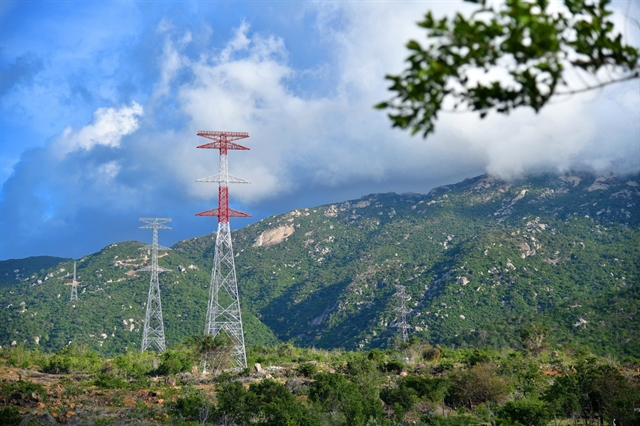 Economy
Economy


|
| The 500kV substation and 220 / 500kV transmission line combined with Trung Nam Thuận Nam solar power plant in Ninh Thuận Province. MoIT is collecting opinions on the draft National Energy Master Plan for the next 30 years. — Photo courtesy of Trung Nam |
HÀ NỘI — The Ministry of Industry and Trade (MoIT) is collecting opinions on the draft National Energy Master Plan for 2021-2030 with a vision to 2050 to ensure national energy security.
According to the MoIT, the local energy economy has changed rapidly in recent decades. Việt Nam has exported crude oil, coal and natural gas, making important contributors to the national budget in the last 20 years.
The ministry also said energy imports have had a strong tendency to increase in recent years.
Last month, in a conference in Hà Nội, deputy Minister of Industry and Trade Đặng Hoàng An said: “From 1997 to 2019, Việt Nam's economy maintained a growth rate of nearly 7 per cent. Its energy demand in the recent 10-year period increased 6.5 per cent for primary energy while demand for electricity rose 10.5 per cent in the period.”
To ensure adequate energy supply for social and economic development as well as national defence, the ministry determined a national energy master plan is needed.
The ministry said the national energy master plan for 2021-30 with a vision to 2050 is expected to build scenarios that will not increase energy costs, prevent energy from becoming a burden for the economy, ensure harmonised energy development and contribute to promoting the country’s economic development.
The ministry said the master plan was to help provide a comprehensive assessment of national energy supply and demand and connect energy development with socio-economic-environmental development goals set by Việt Nam and its commitments to the international community.
The MoIT said the plan would ensure the harmonious development of energy sub-sectors while also creating favourable conditions for State management in the energy sector.
At the same time, most experts considered renewable energy a solution to the risk of electricity shortages and for sustainable and green growth in Việt Nam where cheaper thermal power has been harming the environment.
Trần Anh Tuấn, Secretary of the World Energy Council, recently told local media: “The development of renewable energy such as wind, solar power, hydrogen will be an inevitable trend to create a clean, low-cost, stable and environmentally friendly source of energy.”
Commercial electricity growth is estimated to increase rapidly and strongly in the next 15 years.
Nguyễn Thế Thắng, Head of the Electrical System Development Department under the Institute of Energy, told local media in one scenario commercial electricity will reach 490.8 billion kWh by 2030 and 976 billion kWh by 2050, maintaining an increase of 8.3 per cent in 2021-30, then by only 3.4 per cent in 2031-50.
In another scenario, commercial electricity will reach 523 billion kWh in 2030 and 1.110 billion kWh in 2050.
In the past years, Việt Nam has built small hydropower plans, considered a form of renewable energy with a minimal negative impact on the environment and one that promotes rural economic development.
According to the MoIT, Việt Nam has more than 1,000 potential small hydropower developments across the country, ranging from 100 kW to 30 MW, with a total capacity of more than 7,000 MW, the biggest capacity among ASEAN countries.
However, due to climate change and droughts, many hydropower reservoirs could not work due to lack of water while some construction projects have been delayed. The ministry would not allow developing super small projects with a capacity of below 30MW, as they could not be the solution to national energy security.
Meanwhile, the traditional thermal power using coal was proved to harm the environment and was no longer being developed in most other countries, so the ministry has made some changes in its latest Power Plan VII.
At the end of last week, Minister of Industry and Trade Trần Tuấn Anh and his South Korean counterpart, Sung Yunmo, signed an energy co-operation deal between the two sides at the 10th Meeting of Viet Nam-RoK Joint Committee on Energy, Industry and Trade Cooperation, in which they will boost Korean investment in liquefied natural gas power and renewable energy projects as well as co-operation in improving efficiency and safety of energy in Việt Nam.
At the same time, Ninh Thuận Province in south-central Việt Nam with a total of more than 2,800 hours of sunshine a year asked the MoIT to report to the Prime Minister for additional regulations to encourage more investment in solar power in the province.
According to Ninh Thuận’s Department of Industry and Trade, of the 37 solar power projects with investment policy decisions issued, 31 projects have operated commercially with a total capacity of 2,173.51MW and five projects are expected to be put into commercial operation by the end of this year.
Groups which invested much in the industry in the province included Trung Nam, BIM, Thiên Tân and Xuân Thiện.
MoIT has publicised the draft and asked for comments on its website. — VNS